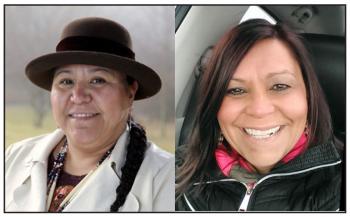Image Caption
Summary
Local Journalism Initiative Reporter
Windspeaker.com
A question asked Jan. 14 during the weekly forum on COVID-19 hosted by the First Nation Health Managers Association underscored another deadly aspect of the coronavirus pandemic: an unsafe illegal drug supply.
One listener emailed the panel of four health professionals and asked how a person could keep safe in a “reality (that) leads me to want to escape even more.” The listener pointed out that with the closure of the United States border, the access to quality and safe illegal drugs was decreasing.
“All this said, I do want to live through this time and don’t want to die over an unsure and unsafe supply,” the person wrote.
“With this question coming into this forum, you are going to save lives. Maybe even your own,” said the tearful host Marion Crowe, chief executive director of FNHMA.
“There are many sources of contaminated drugs that are taking the lives of First Nations people across this country. The death and the impact of overdose far outweighs the death and impact of COVID-19,” said Dr. Carol Hopkins, executive director of Thunderbird Partnership Foundation.
In December, Alberta Premier Jason Kenney stated in a news conference that the rate of opioid overdose deaths amongst First Nations had increased by 61 per cent from 2019 to the first six months of 2020. At that time, Kenney introduced the province’s more comprehensive substance use surveillance system, which will collect more data, including zones and demographics, to provide more targeted “recovery-oriented care.”
A July report from the First Nations Health Authority (FNHA) for British Columbia comparing the first five months in 2019 to the first five months in 2020, indicated a 93 per cent increase in First Nations deaths due to overdose.
The FNHA blamed COVID-19 safety measures for disrupting the drug supply leading to a more toxic supply. FNHA also stated that COVID-19 public health measures, which require physical distancing and staying home “may be having unintended negative consequences for people who use substances. People may be less likely to access harm reduction services and supports and may be using alone when they otherwise would not have.”
“We cannot ignore the public health challenge we have related to people who rely and depend on drugs to get through their day. We can't judge them,” said Hopkins.
“Make only simple decisions that save your life and allow you to honour your life each and every day,” advised Dr. Brenda Restoule, CEO for First People Wellness Circle.
Hopkins and Restoule offered a number of precautions that could be taken.
Hopkins suggested safe consumption sites, which check drugs to make sure they are safe, provide safe and clean paraphernalia for drug use, and provide support in case of drug overdoses.
However, she said, there are few safe consumptions sites on First Nations.
With that in mind, Hopkins said there were tools available to test the safety of drugs and those tools now required a smaller amount of a user’s drug supply for testing.
Restoule suggested that the user have a circle of “trusted, caring people” to ensure their safety. She also said it was vital to have a Naloxone kit and to ensure somebody knows how to use it.
She also pointed out that there are local, regional and national overdose prevention hotlines that can be called when someone is using on their own. The operator remains on the line to ensure the user is safe.
Hopkins said it was important for users to get a safe supply of drugs “to ensure that they maintain the right to live without imposing treatments or other interventions… We often think, ‘Well, if you just went to treatment’ or ‘If you just went to counseling’ or ‘If you just did a number of things you wouldn't need that drug.’ Our society is also changing the way we think. Again that stigma about why people use drugs.”
The emailed question was “courageous … (and) brought me to tears thinking about the challenges of our relatives across Turtle Island and how difficult it is,” said Restoule.
“That intention to stay alive; I would say, each and every day, give gratitude for your life because Creator sees a special purpose for you.”
The National Overdose Response Service prevention hotline is 1-888-688-6677.
Local Journalism Initiative Reporters are supported by a financial contribution made by the Government of Canada.

